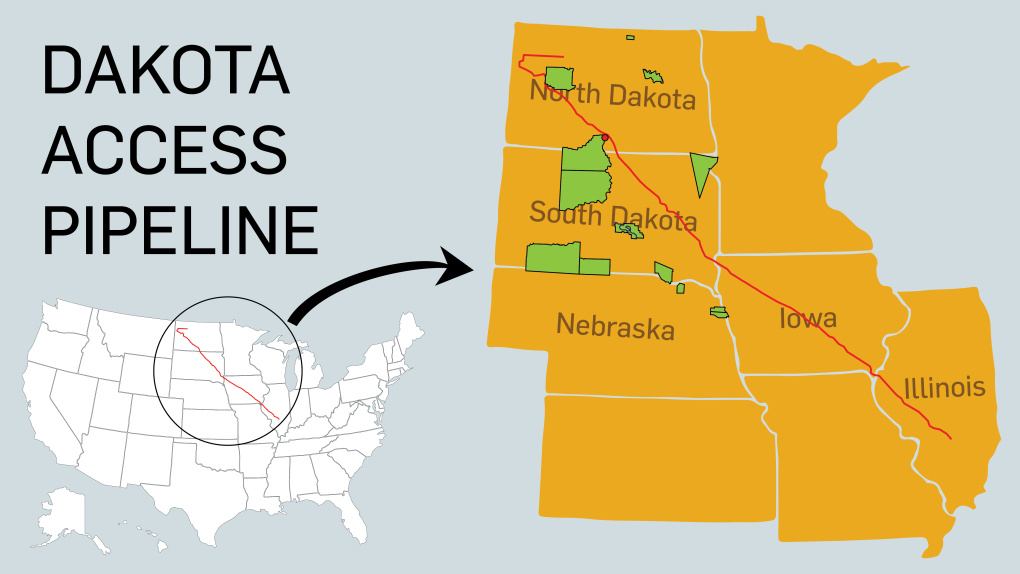Upcoming Dakota Access Pipeline (DAPL) Hearing
Posted on April 5th, 2021
Posted in Uncategorized

On April 9th of this year, there will be a federal court hearing on the Dakota Access Pipeline (DAPL) to determine whether its continued operation conforms with environmental policy and regulation. This follows a federal appeals court ruling in January that found the DAPL to be operating illegally without the necessary legal permitting. The April 9th hearing could result in the closing, at least temporarily, of the 570,000 bpd pipeline in the Bakken.
The closure of the DAPL, which has expansion plans to eventually increase capacity to 1.1 MMbpd, would have a substantial impact on immediate operations and production costs as well as setting a potential legal precedent for the closure of Oil & Gas and other Energy infrastructure. The closure of the Keystone XL Pipeline and litigious action against other pipeline infrastructure in the region has already forced a dramatic increase in costlier rail transport of crude products. Closure of the DAPL would further exacerbate this situation.
Plaintiffs in the hearing assert the approval for the DAPL was issued in 2017 without due diligence and appropriate permitting processes and are seeking, at a minimum, a shutdown of the pipeline while the United States Army Corps of Engineers can conduct and provide a court-ordered Environmental Impact Statement. Such a review could easily extend well into 2022. While production in the Bakken remains well below pre-Covid production levels, pipeline capacity in Canada and the northern United States remains at a premium. Further restrictions to transport capacity would likely have significant immediate and long-term effects on operator P&Ls, local and regional economies, field development, and policy making.
On January 27th, President Biden issued an Executive Order on Tackling the Climate Crisis at Home and Abroad. That Order and subsequent actions have certainly appeared to affirm that this current Administration will not tolerate energy infrastructure with poor or insufficient environmental credentials. The cascading impacts of making large, sweeping changes – especially without appropriate alternatives in place – will be momentous. We must as an industry and as a society be prepared to mitigate these impacts now while championing effective and economical environmental stewardship for all of our future energy projects.
 Curtis Anderson is a seasoned Projects Director at Halker, specializing in managing projects for electric utilities and renewable energy companies, including high voltage power, solar, wind, and battery energy storage systems (BESS). Prior to his current role, Curtis held various leadership positions with 12 years in the industry. As Technology Innovation Manager, he was instrumental in establishing and leading a Product and Innovation team within the Power and Renewables Industry, driving technology enablement initiatives, and fostering a culture of innovation. His work included guiding the development of new products, implementing AI-driven solutions, and supporting the launch of industry-first SaaS offerings. Curtis also played a key role in business-to-business collaborations, strategic planning, and served as a member of an Artificial Intelligence Governance Board, focusing on enhancing operational efficiency through technology and R&D efforts.
Curtis Anderson is a seasoned Projects Director at Halker, specializing in managing projects for electric utilities and renewable energy companies, including high voltage power, solar, wind, and battery energy storage systems (BESS). Prior to his current role, Curtis held various leadership positions with 12 years in the industry. As Technology Innovation Manager, he was instrumental in establishing and leading a Product and Innovation team within the Power and Renewables Industry, driving technology enablement initiatives, and fostering a culture of innovation. His work included guiding the development of new products, implementing AI-driven solutions, and supporting the launch of industry-first SaaS offerings. Curtis also played a key role in business-to-business collaborations, strategic planning, and served as a member of an Artificial Intelligence Governance Board, focusing on enhancing operational efficiency through technology and R&D efforts. Shannon McKibben is the director of Environmental Engineering at Halker, executing environmental, health, and safety projects for clients in construction, oil & gas, transportation, and power delivery. Under Shannon’s leadership, Halker’s Environmental Engineering group is actively diversifying from its historical role serving primarily road and highway construction clients into a support group for all of Halker’s projects, focusing on energy delivery and development.
Shannon McKibben is the director of Environmental Engineering at Halker, executing environmental, health, and safety projects for clients in construction, oil & gas, transportation, and power delivery. Under Shannon’s leadership, Halker’s Environmental Engineering group is actively diversifying from its historical role serving primarily road and highway construction clients into a support group for all of Halker’s projects, focusing on energy delivery and development. Dominic brings over 15 years of leadership in privately held and PE‑backed firms. Dominic’s experience in the energy industry expands across several sectors, including refining, midstream & pipeline and delivering fully modular facility solutions in the upstream production arena. Dominic has been involved in the sales and project management of more than 30 fully modular facilities in the Permian basin. He has built scalable go‑to‑market strategies that have helped drive impressive revenue growth: from $10M to $25M at Welker, and launching Petrosmith’s Modflex line to $40M in three years, while more than doubling revenue with its largest client.
Dominic brings over 15 years of leadership in privately held and PE‑backed firms. Dominic’s experience in the energy industry expands across several sectors, including refining, midstream & pipeline and delivering fully modular facility solutions in the upstream production arena. Dominic has been involved in the sales and project management of more than 30 fully modular facilities in the Permian basin. He has built scalable go‑to‑market strategies that have helped drive impressive revenue growth: from $10M to $25M at Welker, and launching Petrosmith’s Modflex line to $40M in three years, while more than doubling revenue with its largest client. 




 Philip Barr joined Halker in April 2023. With nearly 20 years of structural engineering experience, he has contributed to projects across the oil and gas, pharmaceutical, chemical, mining and metals, and manufacturing industries. Philip has successfully led structural design teams in executing projects totaling over one billion dollars in value. He has also worked internationally as a field engineer and client representative, gaining valuable experience in constructability, modular design, and retrofit construction. As Halker’s Director of Structural Engineering, Philip draws on his extensive background and technical expertise to deliver innovative and cost-effective structural solutions for clients across a wide range of industries.
Philip Barr joined Halker in April 2023. With nearly 20 years of structural engineering experience, he has contributed to projects across the oil and gas, pharmaceutical, chemical, mining and metals, and manufacturing industries. Philip has successfully led structural design teams in executing projects totaling over one billion dollars in value. He has also worked internationally as a field engineer and client representative, gaining valuable experience in constructability, modular design, and retrofit construction. As Halker’s Director of Structural Engineering, Philip draws on his extensive background and technical expertise to deliver innovative and cost-effective structural solutions for clients across a wide range of industries.
 Cory Shattuck is the Vice President of Power Services at Halker, based in Centennial, Colorado. With a career spanning roles such as Director of Power Delivery, Utility-scale Solar Technical Manager, Substation Technical Manager, and various engineering positions, Cory brings a wealth of experience to the energy sector. Cory’s expertise includes substation design, medium-voltage underground collection systems, electrical studies, and relay settings. In his current role, he leads the Power Services division, overseeing project execution, technical excellence, and strategic growth. His leadership is grounded in a commitment to quality, safety, and innovation in power delivery solutions. He has served as a Quality Manager for a key client and contributed to both Quality and Safety Committees. Cory holds a Bachelor of Science in Electrical Engineering from the South Dakota School of Mines and a Master of Business Administration from Colorado State University. He is also a licensed Professional Engineer.
Cory Shattuck is the Vice President of Power Services at Halker, based in Centennial, Colorado. With a career spanning roles such as Director of Power Delivery, Utility-scale Solar Technical Manager, Substation Technical Manager, and various engineering positions, Cory brings a wealth of experience to the energy sector. Cory’s expertise includes substation design, medium-voltage underground collection systems, electrical studies, and relay settings. In his current role, he leads the Power Services division, overseeing project execution, technical excellence, and strategic growth. His leadership is grounded in a commitment to quality, safety, and innovation in power delivery solutions. He has served as a Quality Manager for a key client and contributed to both Quality and Safety Committees. Cory holds a Bachelor of Science in Electrical Engineering from the South Dakota School of Mines and a Master of Business Administration from Colorado State University. He is also a licensed Professional Engineer.



